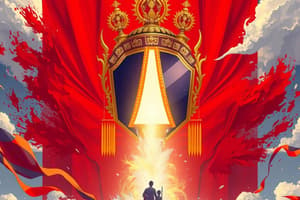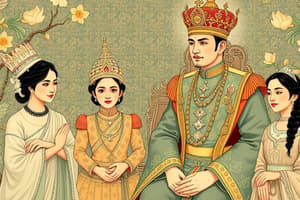Podcast
Questions and Answers
What is the primary role of the Thai monarch in the political system?
What is the primary role of the Thai monarch in the political system?
- To lead the military forces during coups
- To enforce laws and regulations strictly
- To serve as the head of government and make policy decisions
- To function as the ceremonial head of state with limited powers (correct)
Which law punishes criticism of the Thai monarch?
Which law punishes criticism of the Thai monarch?
- Anti-corruption law
- Lèse-majesté law (correct)
- Freedom of Speech Act
- Civil Rights Act
What has been a significant factor hindering Thailand's democratization process?
What has been a significant factor hindering Thailand's democratization process?
- Rapid economic growth
- Widespread voter participation
- Military interventions and coups (correct)
- Strong civilian leadership
Which event marked the transition of Thailand from an absolute monarchy to a constitutional monarchy?
Which event marked the transition of Thailand from an absolute monarchy to a constitutional monarchy?
What was one effect of the military rule in Thailand after the 2014 coup?
What was one effect of the military rule in Thailand after the 2014 coup?
Which constitution is considered one of the most progressive in Thai history?
Which constitution is considered one of the most progressive in Thai history?
What is a common justification given for military rule in Thailand?
What is a common justification given for military rule in Thailand?
What incident is associated with a crackdown on pro-democracy protests in Thailand in 1992?
What incident is associated with a crackdown on pro-democracy protests in Thailand in 1992?
Flashcards are hidden until you start studying
Study Notes
Monarchy
- The monarchy has played a significant role in Thai politics and society for centuries.
- The current monarch is King Maha Vajiralongkorn, who has been on the throne since 2016.
- The monarch serves as the head of state, but their powers are largely ceremonial and symbolic.
- The monarchy is highly revered in Thai culture, and criticizing the monarch is punishable by law under the lèse-majesté law.
- The monarch has played a key role in times of political crisis, often serving as a mediator and stabilizing force.
Military Rule
- Thailand has a history of military coups, with the most recent one occurring in 2014.
- The military has played a significant role in Thai politics, often intervening in times of political crisis.
- The military has ruled Thailand for approximately one-third of its modern history.
- Military rule is often justified as a means to maintain stability and prevent political chaos.
- However, military rule has also been criticized for suppressing democracy and human rights.
Democratization
- Thailand has made several attempts to transition to democracy, with the first democratic election held in 1933.
- The country has a constitutional monarchy, with a prime minister serving as the head of government.
- Democratization efforts have been hindered by military interventions, corruption, and political instability.
- The 1997 constitution, which was enacted after a period of democratic reforms, is considered one of the most progressive in Thai history.
- However, the 2014 coup and subsequent military rule have rolled back many of these democratic gains.
Key Events and Figures
- 1932: The Siamese Revolution, which transformed the country from an absolute monarchy to a constitutional monarchy.
- 1973: The student-led uprising, which led to the establishment of a democratic government.
- 1992: The "Black May" incident, in which the military cracked down on pro-democracy protests, leading to widespread violence and deaths.
- Thaksin Shinawatra: A former prime minister who was ousted in a 2006 coup, and whose supporters, known as the "Red Shirts," have played a significant role in Thai politics.
- Yingluck Shinawatra: Thaksin's sister, who served as prime minister from 2011 to 2014 and was ousted in a military coup.
Monarchy
- King Maha Vajiralongkorn has been the monarch of Thailand since 2016.
- The Thai monarchy is primarily ceremonial and symbolic, acting as the head of state.
- Lèse-majesté law criminalizes criticism of the monarch, reflecting the monarchy's revered status in Thai culture.
- Historically, the monarchy has served as a stabilizing force during political crises.
Military Rule
- Thailand has experienced multiple military coups, with the latest in 2014.
- The military governs Thailand intermittently and has a substantial influence in politics, intervening during crises.
- Military rule has comprised about one-third of Thailand's modern history.
- Justifications for military rule include maintaining stability and averting political chaos, but it often comes at the cost of democracy and human rights.
Democratization
- The first democratic election in Thailand occurred in 1933, marking the beginning of democratization efforts.
- Thailand operates under a constitutional monarchy, where the prime minister acts as the head of government.
- Democratization has faced setbacks due to military coups, widespread corruption, and political instability.
- The 1997 constitution is regarded as a landmark in Thai democratic reforms but faced erosion following the 2014 coup.
Key Events and Figures
- The 1932 Siamese Revolution transitioned Thailand from an absolute to a constitutional monarchy.
- The 1973 student-led uprising contributed to the establishment of democratic governance.
- The 1992 "Black May" incident resulted in military action against pro-democracy protests, causing significant violence and casualties.
- Thaksin Shinawatra, former prime minister, was overthrown in a 2006 coup; his supporters are known as the "Red Shirts."
- Yingluck Shinawatra, Thaksin's sister, served as prime minister from 2011 to 2014 before being ousted by the military.
Studying That Suits You
Use AI to generate personalized quizzes and flashcards to suit your learning preferences.




